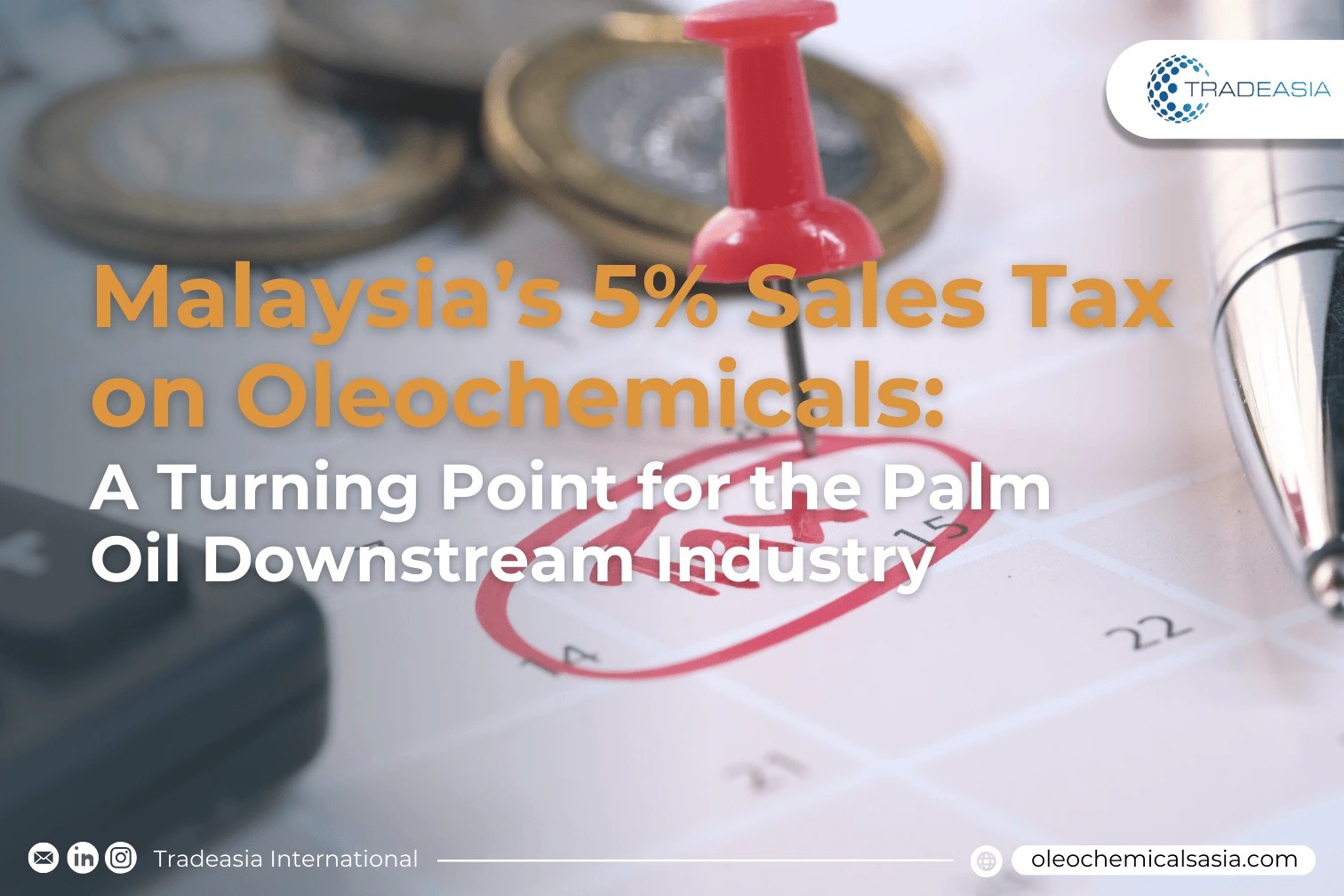The introduction of a 5% sales tax on oleochemical products in Malaysia, effective July 1, 2025, represents a critical policy change for the palm oil downstream industry. For the first time, palm kernel oil (PKO) and its refined derivatives—previously exempt from the sales and service tax framework—are subject to this levy. While the move broadens the government’s tax base, it also introduces cost pressures that may alter Malaysia’s competitive position in the global oleochemical market.
Balancing Fiscal Gains with Rising Industry Costs
The oleochemical industry is a cornerstone of Malaysia’s palm oil sector, contributing 24% of palm oil export value in 2024, equivalent to RM27.5 billion. With the new tax, the government is positioned to collect meaningful additional revenue, though official projections remain undisclosed. For producers, however, the financial impact is immediate and tangible. Estimates from CIMB Securities suggest the tax directly increases input costs by 5%, raising expenses across a wide range of products such as fatty acids, glycerine, surfactants, and bio-lubricants.
Manufacturers face difficult choices in managing these higher costs. While some of the burden can be passed on to customers, industry dynamics suggest a significant portion will be absorbed by producers themselves. This not only compresses already narrow margins but also reduces Malaysia’s ability to compete in price-sensitive export markets. The situation is particularly acute given that post-tax production costs are estimated to rise between 5% and 7%, while export margins typically hover around 8% to 12%.
Industry groups including the Malaysian Palm Oil Association (MPOA) and the Malaysian Oleochemical Manufacturers Group (MOMG) have voiced concerns about the longer-term implications. Early market responses already show signs of disruption, with supply contracts being renegotiated to account for the sudden increase in costs. Such developments raise questions about Malaysia’s ability to sustain its role as a reliable and competitive supplier in the global oleochemical value chain.
Competing in a Region with Friendlier Tax Policies
The regional context underscores the challenges Malaysia now faces. Competitor countries like Indonesia, Thailand, and the Philippines maintain more favorable tax structures for their oleochemical industries. Indonesia, for instance, imposes export duties but avoids a blanket 5% sales tax on palm kernel oil, while also providing incentives for downstream industries such as biodiesel and oleochemicals. Thailand’s tax framework leans toward supporting downstream processing with incentives, and the Philippines, though less developed in oleochemicals, benefits from lower overall tax burdens on palm derivatives.
These disparities could shift trade flows. Malaysia currently exports around 3 million metric tonnes of oleochemicals annually, a figure comparable to Indonesia’s growing output. Yet, with Indonesian producers benefiting from a more supportive policy environment, Malaysia risks losing ground if buyers redirect orders to lower-cost suppliers.
The strategic outlook for Malaysian producers is therefore twofold. In the short term, companies must navigate supply chain disruptions, renegotiated contracts, and thinner margins. Over the longer horizon, industry players will need to emphasize higher value-added oleochemical products, invest in efficiency improvements such as energy optimization, and diversify export markets to reduce dependence on highly price-sensitive buyers. Without such adjustments, the 5% tax could deter future investment in capacity expansion and innovation, eroding Malaysia’s long-standing leadership in this sector.
Ultimately, the tax highlights the government’s need to balance fiscal priorities with industrial competitiveness. While it strengthens public revenue, it also places one of Malaysia’s most critical export sectors under pressure at a time when regional rivals are pursuing policies designed to capture greater market share. Sustained dialogue between policymakers and industry stakeholders will be essential to ensure that revenue goals do not come at the cost of long-term growth and global relevance.
Sources:
-
Sales Tax on Palm Kernel Oil Could Increase Input Costs of Malaysian Oleochemicals Players — CIMB Securities
https://ukragroconsult.com/en/news/sales-tax-on-palm-kernel-oil-could-increase-input-costs-of-malaysian-oleochemicals-players-cimb-securities/
-
Malaysia’s expanded sales tax to hit key petrochemicals from 1 July — ICIS
https://www.icis.com/explore/resources/news/2025/06/17/11111197/malaysia-s-expanded-sales-tax-to-hit-key-petrochemicals-from-1-july
-
Plantation ministry initiates urgent talks with palm oil industry over 5% SST — The Edge Malaysia
https://theedgemalaysia.com/node/759636
-
Malaysia to impose 5% sales tax on over 4,800 goods including petrochem products — Commoplast
https://commoplast.com/news/details/16967/
-
Malaysia Evaluates Impact of 5% SST Tax on Palm Oil Oleochemical Industry, Government Ready to Hear from Industry Players — InfoSAWIT
https://en.infosawit.com/news/15931/malaysia-evaluates-impact-of-5--sst-tax-on-palm-oil-oleochemical-industry--government-ready-to-hear-from-industry-players

Leave a Comment